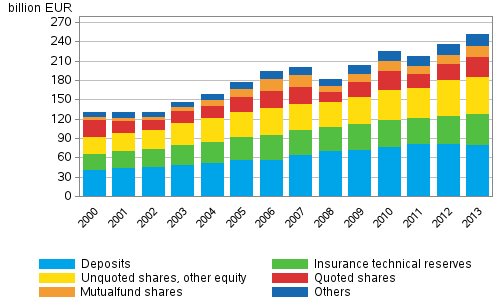Published: 15 September 2014
Households’ total assets grew in 2013
Households' financial assets stood at EUR 252 billion and other assets at EUR 413 billion at the end of 2013. The increase in financial assets was EUR 15 billion during the year and EUR 11 billion in other assets. In addition to the assets, households' debts also grew and amounted to EUR 136 billion. Thus, the value of households' total assets was EUR 529 billion at the end of 2013. In addition to financial assets, the financial accounts now, for the first time, also contain data on other assets that include, for example, buildings and land.
Financial assets of households 2000–2013, EUR billion

Households received holding gains
In 2013, the stock market price development was favourable and as a result, households received EUR six billion in holding gains from quoted shares and mutual funds. Households' net investments in quoted shares amounted to EUR 0.3 billion and EUR 1.2 billion in mutual fund shares. The share of quoted shares and mutual fund shares of households' total financial assets rose to 19 per cent at the end of the year.
Deposits are still the most important financial asset for households. The share of deposits of all households' financial assets stood at 32 per cent at year-end. Within deposits, the shift from fixed-term deposits to cash deposits continued in 2013.
Indebtedness grew moderately
Households' loan debts stood at EUR 127 billion at the end of 2013. Loan debts grew by altogether EUR three billion during 2013, which resulted in households' indebtedness increasing by 0.9 percentage points to 118.1 per cent. Households' indebtedness is calculated as the ratio of their loan debts at the end of the year to their total disposable income of the year.
Revised European System of Accounts in use
In September 2014, EU Member States will introduce the revised European System of Accounts, ESA 2010. This is the first financial accounts release that is accordant with the new ESA 2010 system. Some of the financial accounts time series have changed as a result of the revision. The new system brings changes to the classification of financial assets and the Classification of Sectors. In addition, some details in the compilation principles of the financial accounts have been revised. As the new information system is adopted, annual data on the sectors' other assets in addition to financial assets will be published in connection with the financial accounts.
Source: Financial Accounts, Statistics Finland
Inquiries: Saara Roine 029 551 2922, rahoitus.tilinpito@stat.fi
Director in charge: Leena Storgårds
Publication in pdf-format (421.2 kB)
- Reviews
- Tables
-
Tables in databases
Pick the data you need into tables, view the data as graphs, or download the data for your use.
Appendix tables
- Appendix table 1. Financial assets of households, million EUR (15.9.2014)
- Appendix table 2. Financial liabilities of households, million EUR (15.9.2014)
- Appendix table 3. Households´ net acquistion of financial assets, million EUR (15.9.2014)
- Appendix table 4. Households´ net incurrence of liabilities, million EUR (15.9.2014)
- Appendix table 5. Financial assets of non-financial corporations, million EUR (15.9.2014)
- Appendix table 6. Financial liabilities of non-financial corporations, million EUR (15.9.2014)
- Appendix table 7. Net financial assets by sector, million EUR (15.9.2014)
- Appendix table 8. Net financial transactions by sector, million EUR (15.9.2014)
- Appendix table 9. Statistical discrepancy by sector, million EUR (15.9.2014)
- Appendix table 10. Total assets by sector in 2013, billion EUR (15.9.2014)
- Figures
-
- Appendix figure 1. Financial assets of households, EUR billion (15.9.2014)
- Appendix figure 2. Change in financial assets of households, EUR billion (15.9.2014)
- Appendix figure 3. Households' net acquisition of deposits, quoted shares and mutal funds, EUR billion (15.9.2014)
- Appendix figure 4. Emissions of quoted shares, EUR billion (15.9.2014)
- Appendix figure 5. Households indebtedness ratio (15.9.2014)
- Appendix figure 6. Private sector debt as percentage of GDP (15.9.2014)
Updated 15.9.2014
Official Statistics of Finland (OSF):
Financial accounts [e-publication].
ISSN=1458-8145. 2013. Helsinki: Statistics Finland [referred: 3.3.2026].
Access method: http://stat.fi/til/rtp/2013/rtp_2013_2014-09-15_tie_001_en.html

